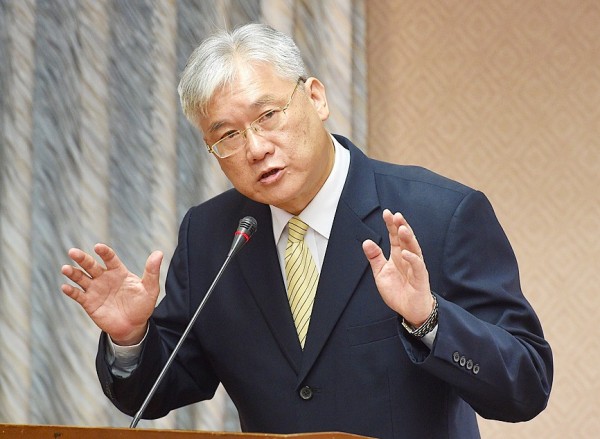《TAIPEI TIMES 焦點》 Minister defends Ma over Xi meeting

Mainland Affairs Council Minister Andrew Hsia yesterday gestures as he makes a report to a meeting of the Legislative Yuan’s Internal Affairs Committee in Taipei. Photo: Lo Pei-der, Taipei Times
By Stacy Hsu / Staff reporter
Mainland Affairs Council (MAC) Minister Andrew Hsia (夏立言) yesterday defended President Ma Ying-jeou (馬英九) amid growing public discontent over his meeting on Saturday with Chinese President Xi Jinping (習近平), saying that Ma is the first Taiwanese politician to mention the Republic of China (ROC) Constitution in front of a Chinese leader.
Hsia made the remarks at a question-and-answer session at the legislature yesterday morning, in response to Democratic Progressive Party (DPP) Legislator Chuang Ruei-hsiung’s (莊瑞雄) criticism of Ma over his failure to publicly mention the “different interpretations” component to the “1992 consensus” at his meeting with Xi in Singapore.
“It is the first time a politician from our nation has spoken of the ROC, the ROC Constitution and the principle of ‘one China, with different interpretations’ in front of Chinese politicians. These terms have never been said more clearly. This is also the only time they have ever been mentioned before such an audience,” Hsia said.
Hsia jumped to Ma’s defense when Chuang accused the council and the president of only attaching importance to the photographs taken during the first official meeting between cross-strait leaders since 1949.
“Who has ever been valiant enough to make reference to the ROC, the ROC Constitution and the ‘one China, with different interpretations’ principle before Chinese politicians? President Ma is the first person to do so,” Hsia said.
Hsia said Ma clearly stated Taiwan’s stance regarding the “1992 consensus” and the “one China, with different interpretations” principle both at the closed-session of the meeting and a post-summit press conference.
The “1992 consensus” refers to a tacit understanding between the Chinese Nationalist Party (KMT) and the Chinese government that both sides acknowledge there is “one China,” with each side having its own interpretation of what “China” means.
While former Mainland Affairs Council chairman Su Chi (蘇起) admitted in 2006 to making up the term in 2000, it has been the KMT’s bedrock for engaging with China.
Hsia also turned down Chuang’s request to make public the complete text of Xi’s remarks at the closed-door session, saying that the council was not in a position to do so.
Asked whether Xi’s statements were too upsetting to be released, Hsia said: “Our remarks were irritating to them, and theirs to us.”
Hsia said it was entirely Ma’s decision to hold a post-summit press conference, while the Chinese only sent Taiwan Affairs Office Minister Zhang Zhijun (張志軍) to hold theirs, but that there was no question of inequality.
Hsia acknowledged the meeting was arranged hastily, giving his officials a score only close to the passing grade.
He said that the likelihood of a second Ma-Xi meeting was slim given that Ma’s presidency is set to expire on May 19.
新聞來源:TAIPEI TIMES




















